Discover the importance of quality essential oils in your skincare and overall wellbeing journey. In this comprehensive guide, we will explore the various factors that define the quality of essential oils, and why it matters when it comes to enhancing your aromacologiC experience.
Table of Contents
What Makes Essential Oil Quality Important?
The quality of essential oils directly impacts their efficacy, safety, and shelf life. Inhaling or applying poorly extracted oils can lead to skin irritation, trigger allergies, and reduce the therapeutic benefits of these amazing products.
Potency
Quality essential oils contain high levels of the right chemical compounds to have a therapeutic effect on the body and mind. Inferior oils may be diluted or adulterated, reducing their potency and consequently, their benefits.
Safety
Proper distillation and extraction methods employed in quality essential oils ensure they are safe to use. Poorly developed oils could contain harmful chemicals, impurities, or synthetic additives that could cause unwanted side effects.
Shelf Life
Quality essential oils have a longer shelf life, ensuring that you can enjoy their benefits for an extended period. Lower quality oils lose their potency and therapeutic properties more quickly.
Factors That Determine Essential Oil Quality
Besides understanding why essential oil quality matters, it’s crucial to recognize the factors that contribute to its quality.
1. Source and Origin of the Plant
The botanical species, where it’s grown, and how it’s cultivated play a significant role in determining the essential oil’s quality. It’s crucial to choose oils derived from plants that are native to their region and grown organically.
2. Extraction Methods and Processing
Essential oils can be extracted through various methods, such as steam distillation, cold pressing, or solvent extraction. Quality essential oils are produced through careful and controlled extraction methods, ensuring that the beneficial components are preserved without being damaged or altered.
3. Purity and Testing
Quality essential oils are pure without any additives, synthetic elements, or contaminants. It’s essential to choose essential oils that undergo rigorous testing and quality control practices, such as Gas Chromatography/Mass Spectrometry (GC/MS) analysis, to guarantee purity and potency.
4. Packaging and Storage
Proper storage and packaging are crucial in preserving the quality of essential oils. Quality essential oils are typically packaged in dark amber or cobalt blue bottles to protect them from UV light. Proper storage involves keeping them in a cool, dark place to maintain their quality.
Quality Essential Oils Example:
Picture this: You’ve just purchased two bottles of lavender essential oil, one from Oshu Oils and another from a less reputable source. The cheaper version may lure you with its affordability, but on closer inspection, you may find that it’s diluted or adulterated, providing reduced therapeutic benefits and potentially causing skin irritation.
In contrast, the lavender essential oil from Oshu Oils comes from a trusted source, has undergone rigorous testing to ensure purity and potency, is packaged appropriately to maintain its quality, and is undeniably more effective in enhancing your aromatherapeutic experience.
Choosing quality essential oils is vital for enriching your skincare, wellbeing, and overall aromacology experience. Understanding the factors that determine essential oil quality and recognizing the superior potency, safety, and shelf life of high-quality oils can elevate your path to natural living.
We hope this guide has provided you with valuable insights into the world of quality essential oils and helped improve your understanding of their importance. If you enjoyed this article and found it helpful, please share it with friends and family, and be sure to explore our other essential oil guides and the Oshu Oils range to enhance your wellbeing journey.





















